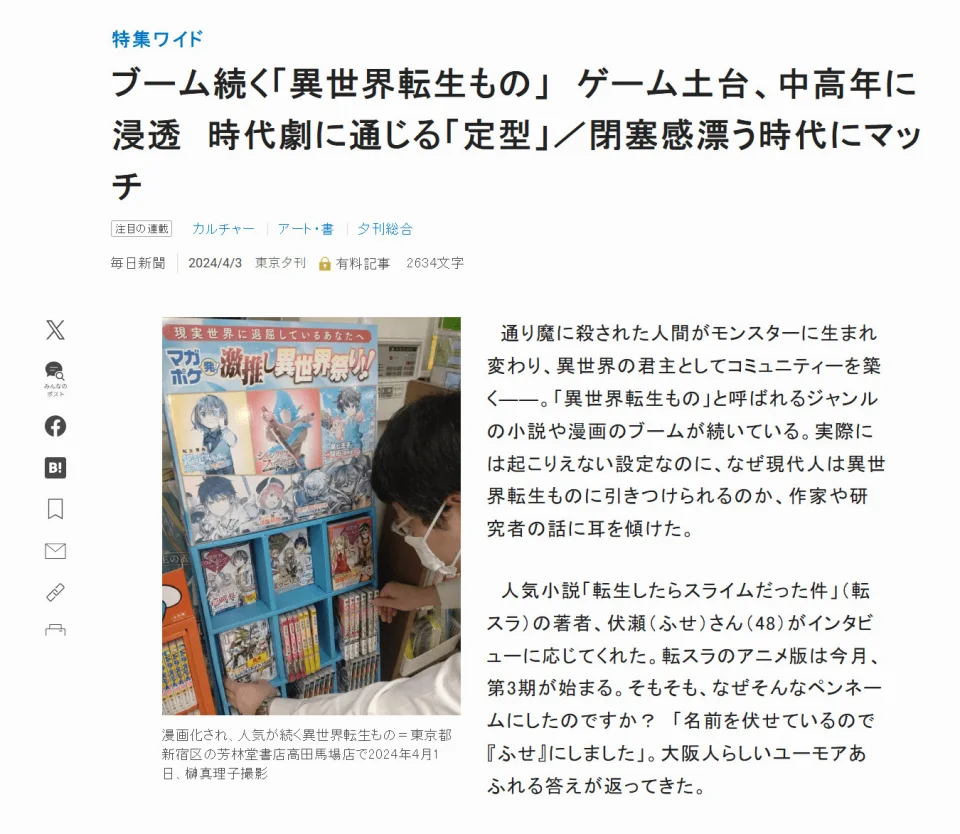Isekai is for old people, according to a new study

An article published in the Mainichi Shimbun about the persistent popularity of "isekai" stories in Japan has become a trend, generating intense debate on social media. Titled "The Continuing Boom of Otherworldly Reincarnation Stories (isekai): From Video Games to Older Generations," the text discusses why this genre continues to attract a wide audience, especially among older adults, and how it connects to narrative traditions such as historical dramas.

The "isekai" genre, or "reincarnation in another world", is characterized by transporting its protagonists to fantastic realities after their death or an extraordinary event. Works such as "Tensei Shitara Slime Datta Ken (That Time I Got Reincarnated as a Slime)," mentioned in the article, have led this trend for years. In an interview with its author, Fuse, he shared how humor and creativity drove both his work and his pseudonym.
Fuse reflects on the appeal of the genre: "The isekai allows us to explore who we are and what we could be in an environment that doesn't have the constraints of the real world. It's a fantasy of possibilities, especially in a society that often feels constrained by strict rules."
The Mainichi Shimbun article notes that "isekai" particularly resonates with older audiences because of its ability to offer a form of escapism in times of uncertainty. However, online comments reflect a range of opinions, from fans praising the depth of the genre to detractors who see it as predictable or a superficial power fantasy:
- "This is just for bored forty-somethings who imagine themselves being heroes in another world."
- "I don't agree! My teenage son is a fan of Re:Zero and Tensei Slime. Young people like it too."
- "It's like historical dramas: the characters follow a pattern, but that's also part of the charm."
- "We are fed up with the same stories. In the end, the protagonist becomes invincible and there is no real tension."
- "The problem is that a lot of these stories start and end in the title. I don't even need to read them anymore."
- "This is like old role-playing games. Today's young people don't connect with that."
- "Maybe we should explore futuristic isekai instead of medieval worlds."
- "Even reincarnations have lost their magic. Now we need something new, like a 'remake' of past lives."
- "In such a complicated time, isekai offers hope, the idea of starting over."
- "People have always sought escapism, whether it's in historical dramas or fantasies like this."
- "Reincarnating in another world? Better try to fix your lives here first."
- "The isekai teaches nothing; it only reinforces the idea that life is better if everything is magically resolved."
- "The isekai needs to be renewed. The invincible protagonist and the generic fantasy world are no longer enough."
- "What if we explored more of the psychological consequences of reincarnating in another world?"
Although some critics believe that isekai is losing relevance among younger generations, titles such as "Re:ZERO – Starting Life in Another World" and "Mushoku Tensei: Jobless Reincarnation" continue to find success with diverse audiences. However, the genre also faces challenges from its saturation in the manga and anime industry, with many expecting it to evolve into fresher and more innovative narratives.
While "isekai" dominate a significant part of the entertainment market in Japan, discussions about their future relevance show how audiences are increasingly interested in stories that break with established formulas. Will the "isekai" be able to reinvent itself and continue to conquer audiences, or will it give way to new trends?
Source: Mainichi Shimbun
Copyright THE MAINICHI NEWSPAPERS. All rights reserved.

